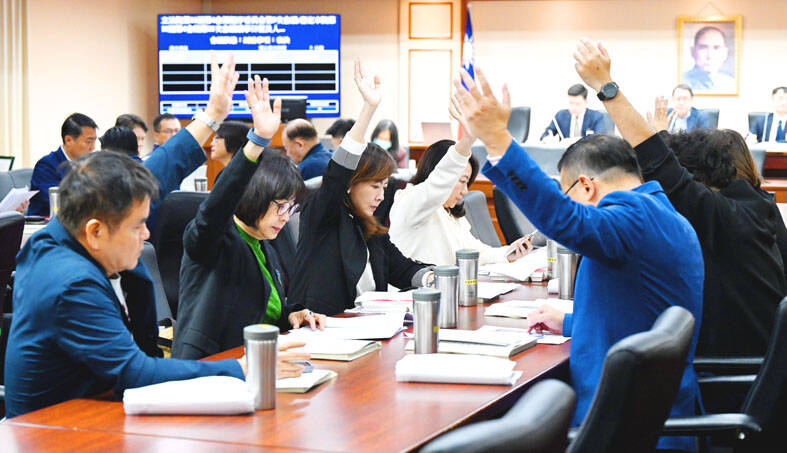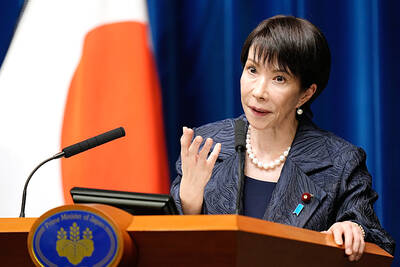Opposition parties yesterday used their numerical advantage to postpone placing the Executive Yuan’s draft of the fiscal planning act on Friday’s agenda, preventing it from receiving a first reading or being sent to a committee.
As the Procedure Committee was scheduling Friday’s and next Tuesday’s legislative schedules, the Taiwan People’s Party (TPP) proposed postponing inclusion of the Executive Yuan’s draft amendment to the Act Governing the Allocation of Government Revenues and Expenditures (財政收支劃分法).
Although Democratic Progressive Party (DPP) legislators opposed the move, the Chinese Nationalist Party (KMT) sided with the TPP, using the combined numerical advantage of the two opposition parties in the committee to pass the motion by nine votes to seven.

Photo: Liao Chen-huei, Taipei Times
The vote also blocked draft amendments regulating lawmakers’ travel to China for national security purposes.
TPP Legislator Liu Shu-pin (劉書彬), who proposed the blocking measure, said that not placing items on the agenda was effectively the same as sending them back to the Executive Yuan.
It would not be handled in this session, but could be proposed again next time, Liu said.
The TPP discussed the move with the KMT beforehand, she said, adding that there has been no follow-up discussion about when it might be placed on the agenda.
DPP Legislator Lai Jui-lung (賴瑞隆) asked Premier Cho Jung-tai (卓榮泰) if he would reconsider or refuse to sign amendments to the act proposed by opposition parties.
Cho said that he hopes that the version of the act from the National Audit Office would halt discussions about the wording of the legislation, making the Executive Yuan’s version the only viable option.
The Executive Yuan’s version has undergone more than six consultations with local governments, making it the most likely to achieve consensus and be brought before the Legislative Yuan for discussion, Cho said.
The version passed on Nov. 14 would increase government borrowing to NT$560 billion (US$17.81 billion), which exceeds the ceiling set by the Public Debt Act (公共債務法), he said.
The Executive Yuan cannot prepare a budget based on that version, as the budget would be illegal, he added.
Next year’s general budget has already been compiled based on the new version of the fiscal planning act and changes would undermine government administration, he said.
The Executive Yuan passed its version of the act on Thursday last week, with provisions that increased the central government’s allocation to local governments to more than NT$1.2 trillion, exceeding the NT$1.683 trillion approved by the opposition in December last year.
DPP caucus chief executive Chung Chia-pin (鍾佳濱) said that the version of the act passed on Nov. 14 is NT$264.6 billion more than last year’s version, exceeding the government’s borrowing limit and making it difficult to implement.

The Ministry of Foreign Affairs (MOFA) yesterday voiced dissatisfaction with the Comprehensive and Progressive Agreement for Trans- Pacific Partnership (CPTPP), whose latest meeting, concluded earlier the same day, appeared not to address the country’s application. In a statement, MOFA said the CPTPP commission had "once again failed to fairly process Taiwan’s application," attributing the inaction to the bloc’s "succumbing to political pressure," without elaborating. Taiwan submitted its CPTPP application under the name "Separate Customs Territory of Taiwan, Penghu, Kinmen and Matsu" on Sept. 22, 2021 -- less than a week after China

THE GOOD WORD: More than 100 colleges on both sides of the Pacific will work together to bring students to Taiwan so they can learn Mandarin where it is spoken A total of 102 universities from Taiwan and the US are collaborating in a push to promote Taiwan as the first-choice place to learn Mandarin, with seven Mandarin learning centers stood up in the US to train and support teachers, the Foundation for International Cooperation in Higher Education of Taiwan (FICHET) said. At the annual convention of the American Council on the Teaching of Foreign Languages held over the weekend in New Orleans, Louisiana, a Taiwan Pavilion was jointly run by 17 representative teams from the FICHET, the Overseas Community Affairs Council, the Steering Committee for the Test of Proficiency-Huayu, the

A home-style restaurant opened by a Taiwanese woman in Quezon City in Metro Manila has been featured in the first-ever Michelin Guide honoring exceptional restaurants in the Philippines. The restaurant, Fong Wei Wu (豐味屋), was one of 74 eateries to receive a “Michelin Selected” honor in the guide, while one restaurant received two Michelin stars, eight received one star and 25 were awarded a “Bib Gourmand.” The guide, which was limited to restaurants in Metro Manila and Cebu, was published on Oct. 30. In an interview, Feng Wei Wu’s owner and chef, Linda, said that as a restaurateur in her 60s, receiving an

MORE RETALIATION: China would adopt a long-term pressure strategy to prevent other countries or future prime ministers following in Sanae Takaichi’s steps, an academic said Taiwan should maintain communications with Japan, as Japanese Prime Minister Sanae Takaichi is to lead a revision of security documents, Taiwanese academics said yesterday. Tensions have risen between Japan and China over remarks by Takaichi earlier this month that the use of force against Taiwan would constitute a “survival-threatening situation” for Japan. Prospect Foundation president Lai I-chung (賴怡忠) yesterday said Takaichi’s stance regarding Taiwan is the same as past Japanese prime ministers, but her position is clearer than that of her predecessors Fumio Kishida and Shigeru Ishiba. Although Japan views a “Taiwan contingency” as a “survival-threatening situation,” which would allow its military to